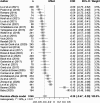Acceptance and commitment therapy processes and their association with distress in cancer: a systematic review and meta-analysis
- PMID: 37746724
- PMCID: PMC11332408
- DOI: 10.1080/17437199.2023.2261518
Acceptance and commitment therapy processes and their association with distress in cancer: a systematic review and meta-analysis
Abstract
Around 42% of individuals with cancer experience distress. Acceptance and commitment therapy (ACT) can reduce distress, but effects are small, and mechanisms unclear. This review aimed to identify associations between ACT processes and distress in cancer. Search terms included cancer, ACT processes, self-compassion, and distress. Six online databases and grey literature were searched until March 2022. Of 6555 papers screened, 108 studies were included with 17,195 participants. Five meta-analyses of 77 studies were conducted. Random effects meta-analyses of correlations revealed higher scores on flexible processes (acceptance, present moment awareness, self-compassion) were associated with lower distress (rpooled = -0.24, -0.39, -0.48, respectively); whilst higher scores on inflexible processes (experiential avoidance, cognitive fusion) were associated with higher distress (rpooled = 0.58, 0.57, respectively). Meta-analyses displayed moderate-to-high heterogeneity with most studies assessed as low risk of bias. Meta-regressions revealed no significant moderators (stage, time since diagnosis, gender and age). This review provides a theoretically aligned evidence base for associations between ACT processes and distress in cancer, supporting elements of ACT theory and providing targeted directions for intervention development. Due to limited evidence, future research should focus on self-as-context, values and committed action and conduct mediation analysis in controlled trials of ACT processes on distress in cancer.
Keywords: Cancer; acceptance and commitment therapy; distress; meta-analysis; oncology; self-compassion.
Conflict of interest statement
No potential conflict of interest was reported by the author(s).
Figures






References
-
- Appelbaum, M., Cooper, H., Kline, R. B., Mayo-Wilson, E., Nezu, A. M., & Rao, S. M. (2018). Journal article reporting standards for quantitative research in psychology: The APA Publications and Communications Board task force report. American Psychologist, 73(1), 3–25. 10.1037/amp0000191 - DOI - PubMed
-
- Barrett, K., O’Connor, M., & McHugh, L. (2019). A systematic review of values-based psychometric tools within acceptance and commitment therapy (ACT). The Psychological Record, 69(4), 457–485. doi:10.1007/s40732-019-00352-7 - DOI
-
- Bennett, R., & Oliver, J. E. (2019). Acceptance and commitment therapy: 100 key points and techniques. Routledge.
-
- Bond, F. W., Hayes, S. C., Baer, R. A., Carpenter, K. M., Guenole, N., Orcutt, H. K., & Zettle, R. D. (2011). Preliminary psychometric properties of the acceptance and action questionnaire–II: A revised measure of psychological inflexibility and experiential avoidance. Behavior Therapy, 42(4), 676–688. doi:10.1016/j.beth.2011.03.007 - DOI - PubMed
Publication types
MeSH terms
LinkOut - more resources
Full Text Sources
Medical
